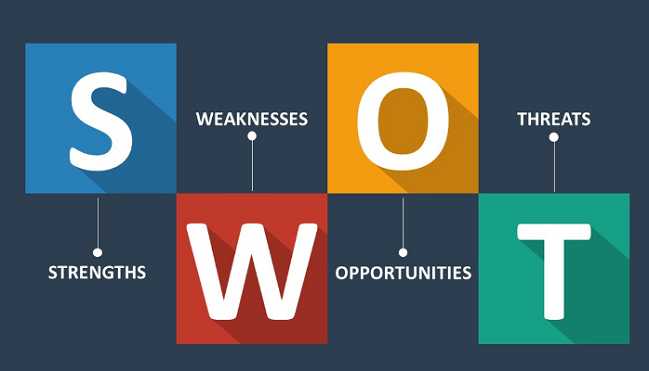How To Use Swot Analysis To Achieve Your Target

Successful businesses understand how to use SWOT analysis. SWOT diagrams or matrices provide important information that your business needs in order to become successful.
What a SWOT diagram does for you is to cross-check your project or business venture by emphasizing each of these factors.
It is usually made up of four boxes, with letters occupying each box while the exact shape depends on the design.
What does SWOT stand for?
SWOT is a popular term that stands for strengths, weaknesses, opportunities, and threats. The Internal factors of an idea or business are considered to be the strengths and weaknesses, while the external factors are considered to be the opportunities and threats.
How does this help a company?
It means the SWOT analysis can help a company's large operations, single department units, as well as the entire organization.
Leaders of organizations, especially those that are the decision-makers usually carry out SWOT analyses to gain a full understanding of how far they are from their goals and success criteria.
Although, the SWOT diagram can also be used to determine how well a marketing team or a specific project, such as a healthcare improvement project, is performing when compared to realistic projections on the ground.

In other ways, the SWOT analyses can be applied in assessing the overall health of a company or organization, as well as individual projects within a single department.
For those who are just thinking about a new idea, you can use the SWOT diagrams when deciding whether or not to pursue a particular venture or strategy by visualizing the pros and cons.
Another great point for leaders of companies and businesses is that they can use the SWOT analysis to easily make decisions whether or not to move forward by clearly outlining all of a project's positives and negatives.
The result from a SWOT analysis usually demands a long, hard look in the mirror, especially as a group which helps to determine what your organization is really good at, areas for growth, as well as what external factors could undermine your efforts.
The actual reason for running a SWOT analysis is to easily complement strengths with opportunities which helps to determine a clear path to success and also to uncover weaknesses that might be used by competitors.
Practical SWOT Example
How is your company doing right now? As you now know, SWOT analysis is one of the most popular and widely used tools for assisting businesses in tapping into the current situations and making better use of the situation to make decisions that will influence the success of the organization.
Some of the top reasons the SWOT Analysis is very popular in business is because of the following three points:
- Due to the fact that it focuses on the internal and controllable factors, which usually have strengths and weaknesses.
- It forces you to consider external factors that are typically beyond your control in order to identify additional opportunities or threats that must be mitigated.
- Because it has a simple 4x4 matrix design and built-in questions about the strengths, weaknesses, opportunities, and threats, anyone can carry out a SWOT Analysis for their business.
To get the best from a SWOT analysis, the leadership team should carry out a "State of Our Business" SWOT Analysis at least once a year, or if they have enough time, they can carry it out on a quarterly basis. This can be included to their the quarterly planning process.
When you do this, it will help your team to understand where the business stands as well as help them to stay focused on the top priorities and objectives that correspond to maximizing "opportunities" and mitigating "threats."
To get you started, here's a quick rundown of each SWOT element.
- Strengths: What does your team excel at? What do you have to offer that others can't or won't?
- Weaknesses: What are those things that your team has a bad record over but that others are good at?
- Opportunities: What are some of those areas where your company could have done very well but is failing to take advantage of?
- Threats: What are those external factors such as competitors, consumer demand, economic conditions which could make your team's success more difficult?
Why are SWOT analyses used?
SWOT analyses are used to learn more about all aspects of a problem, team, individual, or other entity. These assessments are used in nearly every industry, as well as by individuals to assess their progress toward specific goals.
Many people conduct a SWOT analysis before establishing team or organizational goals to ensure they are working toward the right milestones.
Why is a SWOT useful?
SWOT analysis is an important step in developing a digital marketing strategy.
I believe it is sometimes viewed as an academic exercise, with the belief that time should be spent on improving the execution of tactics such as email or search marketing, or on improving the site, but the SWOT analysis will provide you with a strategic view of the main opportunities and challenges available from online marketing.
The high-level view will assist you in identifying the most critical issues that must be addressed in order to meet your business objectives.
Author Bio
For over 4 years, Saalim has worked as a branding, digital marketing, and SEO expert. He has been assisting with website design, SEO strategy, content marketing, and user experience improvements. He publishes on a variety of topics and is a contributing writer to a number of high-quality blogs and websites.
Article Comments
No Comments!
At present there are zero comments on this article.
Why not be the first to make a comment?
Similar Articles
Sponsor
Search Articles
Experts Column
Latest Articles
Featured Articles
Most Popular Articles












